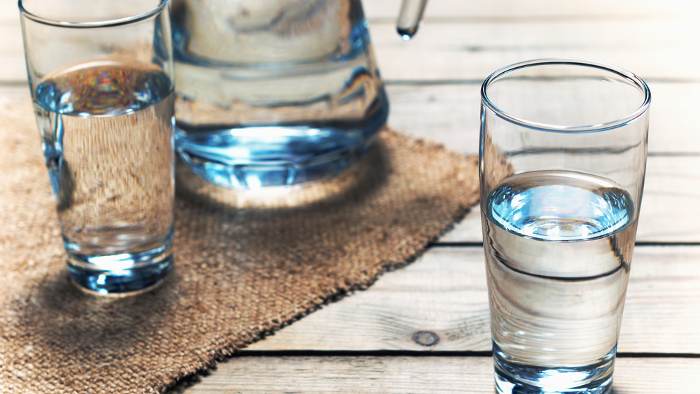
Do you and your partner have two different ideas of what makes a good glass of water? Perhaps one of you prefers ice-cold water, and the other prefers water at room temperature. You may even debate over whose water preference is the best option for your health. You might be wondering, “What is the best temperature to drink water?” Much like the differences between mineral and spring water, water temperatures can have various effects on the body, so there are actually a few things you want to know about both the benefits and risks of warm, hot, and cold drinking water.
What You Need to Know About Drinking Cold Water
Drinking cold water offers a number of health benefits because it helps with hydration, and you might even crave cold water after a workout or on a warm day. Here are some benefits, risks, and the best times to drink cold water.
The Benefits of Drinking Cold Water
Cold water can be refreshing, which actually encourages you to drink more water. This helps keep your body hydrated so your body can function at its best. Drinking cold water can also help boost your metabolism and cool your body temperature during or after exercise. Cold water can also help improve your exercise performance because it reduces your fatigue, allowing you to continue exercising for longer. You may also notice an increase in concentration and alertness, thanks to a cold glass of water. Cold water can also help reduce inflammation and swelling in the body, whether caused by muscle soreness or a health condition like arthritis.
When Is the Best Time to Drink Cold Water?
While there isn’t one specific best time to drink cold water, there are a few guidelines to keep in mind when pouring a glass of cold water. Drinking cold water during exercise offers numerous health benefits. When you drink cold water after a workout or in hot weather, it can also help you cool down and prevent dehydration.
The Risks of Drinking Cold Water
It is important to note that drinking cold water isn’t always the best option. In fact, cold water can have potential downsides and may cause discomfort or issues with digestion in some people, especially during or after eating. When the cold water reaches your stomach, it can cause the muscles to contract and slow down digestion. Drinking cold water can also exacerbate certain health conditions. For most people, the risks of drinking cold water are generally minor.
The Risks and Benefits of Warm Water Explained
Drinking warm or room-temperature water can also provide you with a variety of health benefits. In addition to keeping you hydrated, you may find that room-temperature water is a more comfortable experience than when the water is too cold or too hot. Here are some of the benefits, risks, and best times to drink warm water.
The Benefits of Drinking Warm Water
When you drink water, it helps stimulate digestion and promote healthy movement of food through your digestive system. Warm water can help this process work more effectively because the body doesn’t have to adjust to too high or low water temperature. Warm water can also help soften stools, reducing the risk of constipation and easing bowel movements. Warm water can also promote relaxation, as room temperature water has been shown to offer a calming effect on the body, reducing stress and anxiety. Warm water can also help improve your circulation and increase blood flow, which can be especially beneficial for people with recent injuries or certain health conditions.
When Is the Best Time to Drink Warm Water?
Warm water can be the best option when you want to hydrate on a very hot or very cold day. Room-temperature water can cause less of a shock to the system and allow your body’s temperature to regulate more effectively. Because room-temperature water has also been known to promote relaxation and reduce stress, a small glass of warm water when you wind down in the evening can also help prepare you for a good night’s sleep.
The Risks of Drinking Warm Water
Drinking room-temperature water is generally considered safe for most people. In rare instances, warm water could interact with medications, so you should follow all instructions carefully or talk to your healthcare provider if you have any questions or concerns. In general, the risks of drinking warm water are generally considered minor.
Know Why and When Hot Water is Good for You
In some cases, drinking hot water might sound like the best option. Perhaps you’ve been outside on a cold, blustery day and are looking for a quick way to warm up and also rehydrate. Here’s what you need to know about the benefits and risks of drinking hot water.
The Benefits of Drinking Hot Water
Hot water is just as hydrating as cold or warm water. It can also help promote digestion and reduce digestive issues like constipation, bloating, or indigestion. Hot water can help increase blood flow and improve circulation in the body, which can help with certain health conditions. Inhaling the steam from hot water can also help loosen mucus and relieve nasal congestion, making it a great natural remedy for cold and flu symptoms. Drinking hot water can also have a calming effect and help reduce your stress.
When Is the Best Time to Drink Hot Water?
Drinking hot water first thing in the morning can help promote hydration and kickstart your metabolism. Hot water can also help relieve certain symptoms when you are sick, including congestion, sore throat, or coughing. You may also experience better sleep if you have a small cup of water before bed.
The Risks of Drinking Hot Water
One potential risk of drinking hot water is that too high temperatures could cause burns or scalds in the mouth or throat. Always pay attention when you drink something hot to avoid this type of pain and discomfort.
What is the Best Temperature to Drink Water?
There is no specific “best” temperature to drink water, though there are benefits to different temperature levels depending on certain circumstances. In general, room-temperature water is considered the most comfortable, no matter the time of day. Warm water won’t interfere with digestion, and this temperature is tolerable for most people. Cold water can be extra refreshing and satisfying on a hot day or after you’ve been working out. Hot water might offer additional benefits when you are under the weather and want something soothing or comforting.
Get the Best Drinking Water in Your Home & Office Today
Enjoy easy access to water at your preferred temperature when you drink natural spring water from Lipsey Water. Our water is sourced naturally from the Blue Ridge Mountains and offers a pure taste and environmentally friendly option for reusable water bottles. Contact us today for spring water delivery to your home or office and find out why Lipsey Water supplies the freshest-tasting water in Atlanta.
